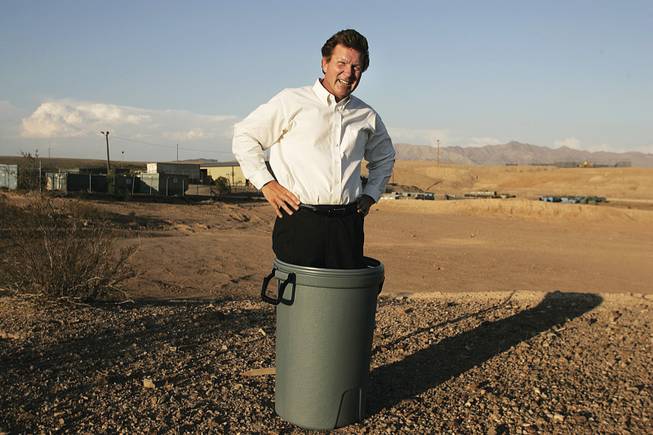
Mike Little sees an opportunity to make money by turning trash into energy. The Reno entrepreneur is pursuing a plan to build a plant in Boulder City.
Wednesday, Oct. 1, 2008 | 2 a.m.
Mike Little is an alchemist, entrepreneur, developer and accidental environmentalist who has been pushing plans for a trash-to-energy plant in Boulder City.
Boulder City has been listening carefully, although it has not made any commitments.
Little, president of Landfill Alternatives, thinks his timing is perfect for a research project aimed at ending the need for new landfills. The technology is proven. Trash can be mechanically digested into compost that produces methane gas, which, in turn, can fuel a power generator.
Now it’s a matter of making it work on a large scale.
Are you a crunchy environmentalist?
I’ve never said I’m not in it for the money. I am. But it is nice to know what you’re doing is good. I hear, “We’re going to save the Earth if someone subsidizes it.” I want to develop technology and take it to the capitalistic marketplace. Then it’s every dog on its own.
What makes Boulder City the perfect place for your first plant?
A lot of people look at a landfill like a garbage pit. It’s a research facility and science project. Boulder City has a unique set of circumstances in that it’s a small enough scale and has a landfill that’s nearly full.
What’s your background for doing this?
I got interested in making money in the trash business. It looked like there was an opportunity. It occurred to me that we cannot continue to bury trash. It can be a resource.
How is the timing for a project like this?
Perfect. I think biofuels are the biggest thing since the smokestack industry or the computer industry in the 1980s. Alternative fuels are needed. And it’s getting more expensive to haul trash and bury it.
This is a small-scale industrial plant. Can this project be safe?
There are a lot of checks and balances. There’s the Southern Nevada Health District. There would be university involvement and municipal contracts. The county and state would be watching.
What is the long-term plan for your business?
Once we have the data we can produce the plants to scale and they could go anywhere. We would also help municipalities make the transition away from a landfill. Right now we’re applying for public grants to help out with the initial cost of about $200,000.

Join the Discussion:
Check this out for a full explanation of our conversion to the LiveFyre commenting system and instructions on how to sign up for an account.
Full comments policy